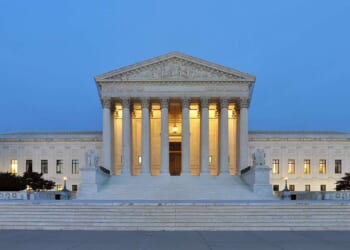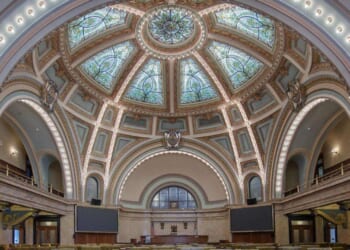It is always sad to see a pillar of the Establishment feebly attempting to embrace the radical zeitgeist. It is, after all, extremely difficult to pass oneself off as an iconoclast when one is averse to breaking anything.
The Royal National Theatre might do well to keep that in mind, if its latest season — its first under new director Indhu Rubasingham — is anything to go by. Let us turn in our hymnals to Bacchae, a reinterpretation by the actor Nima Taleghani (his writing debut) of the classic play by Euripides, which is intended to begin Rubasingham’s tenure. The summary of which, on the National Theatre’s website, begins “This ain’t no classic play b*tches”.
It was Chekhov who stated that “the role of the artist is to ask questions, not answer them,” and it appears that the National has now wholeheartedly embraced that outlook. Questions abound, such as “Will contemporary audiences really have their minds blown by an irreverent attitude towards the classics?”, “Are the sensitivities of those who frequent its hallowed brutalist halls too unsteady to cope with the word ‘bitches’ unasterisked?” and “Should there be a comma after the word ‘play’?” Alas, we may never know.
The play’s summary seems desperate to appear edgier than a dodecahedron. “These fangirls may be a pack but they’re not animals… They are stage-storming powerhouses ready to cause chaos in Thebes”, we are breathlessly informed. The god Dionysus “is taking part in his own f*cked-up family Olympics.” Yes, that’s right, I said f*cked. With another asterisk. This is the National Theatre; we’re cool and edgy and ready to f*ck sh*t up, you b*stards — as long as we stick to an overpriced merlot in the bar at the interval and we’re home at a reasonable hour.
What next, one wonders — audience participation in the ice-bucket challenge?
The drama — wanted or unwanted — doesn’t end there, of course. The Sunday Times tells us that the season’s other opening play, Hamlet (starring Olivier-winning Hiran Abeysekera) features a trailer in which the actor can found “declaiming, ‘To be or not to be,’ before adding a sardonic ‘innit’, winking at the camera, patting a skull and putting on a pair of hipsterish shades”. Hamlet, as reimagined by Rick from The Young Ones. Oh, and there is going to be a collaboration between the Theatre and — wait for it — Stormzy! That might have been a cutting-edge idea — last decade. What next, one wonders — audience participation in the ice-bucket challenge?
Ms Rubasingham was being interviewed by the Sunday Times ahead of the season’s opening, which is when these facts and more first came to light. We are informed that Ms Rubasingham’s “sort of slogan” for her first season is to be “bringing the world to the National, taking the National to the world”, and that “rather than state-of-the-nation plays, I would rather commission state-of-the-world plays”. This is not an unreasonable position, although one might wonder then whether the name of the Theatre might yet be changed to the “International”. Given that Ms Rubasingham previously presided over a small theatre in Hampstead which had gone by the name of “The Tricycle” until she made the highly unpopular decision to change it to “The Kiln”, we should not dismiss a further name-change as a possibility.
It is at this point where I should admit that my view of Ms Rubasingham — and of the Tricycle/Kiln — was permanently affected by the theatre’s decision in 2014 to reject the UK Jewish Film Festival. At the time Israel and Hamas were fighting directly in one of the periodic Gazan escalations that has marked the unhappy history of the region, and as Ms Rubasingham told the Guardian, “The festival receives funding from the Israeli embassy and, given the current conflict in Israel and Gaza, we feel it is inappropriate to accept financial support from any government agency involved.” She went on to say that the theatre had offered to provide alternative sponsorship for the festival so they could reject the money from the Israeli embassy, but the festival had declined and so had withdrawn from the theatre. Whether or not Ms Rubasingham intended it, she was in the vanguard of a movement which, a decade later, has seen numerous sites close their doors to the UK Jewish Film Festival since October 7th 2023. There are also people within the UK’s Jewish community — avid theatre-goers — who have never frequented the Tricycle/Kiln in the decade-plus since.
This is relevant insofar as it led, in the Sunday Times interview, to the one question that Ms Rubasingham apparently had great difficulty in answering — “The British Museum took a £50 million sponsorship from BP. Would Rubasingham be happy if the National did that?”
Her eventual reply had all the clarity of frosted glass — “we have to take all the emotion out of the decision, and do due diligence. We have robust procedures in place for that”. But given that, as the interviewer noted, the current £16 million subsidy the theatre receives from the public coffers is unlikely to rise, the theatre is required to pay back a £20 million pandemic survival loan from the Government and Ms Rubasingham does not want to raise ticket prices, that’s an issue which is likely to be a real one sooner or later. And unless she can come up with a better response, the National Theatre might find itself, in its own parlance, “up sh*t creek with no f*cking paddle, b*tches”.







